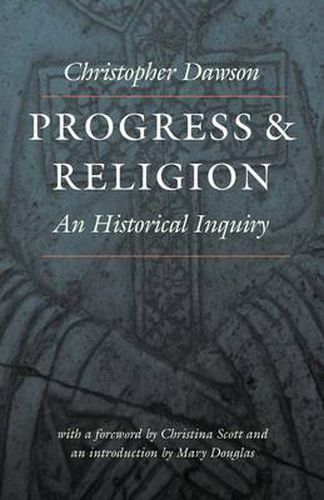Readings Newsletter
Become a Readings Member to make your shopping experience even easier.
Sign in or sign up for free!
You’re not far away from qualifying for FREE standard shipping within Australia
You’ve qualified for FREE standard shipping within Australia
The cart is loading…






In this volume Christopher Dawson outlines his main thesis for the history of culture, which was his life’s work. Anthropology, sociology, philosophy, religion and history form the backdrop for the key idea of his thought - namely, that religion is the soul of a culture and that a society or culture which has lost its spiritual roots is a dying culture. To Dawson, a return to the Christian culture that had formed Western civilization was the only remedy for a world adrift. Dawson was writing in a period between the two great wars of the 20th century, a time when some thought that the idea of progress had finally been discredited by the carnage and barbarism of World War I. This text was designed to challenge the doctrine of progress, the rather naive but persistent belief that
in every day and in every way the world grows better and better . Dawson argued that Western civilization was at a turning point and confronted with two real choices: reappropriate a vital Christian culture or move increasingly toward more dangerous and alienated expressions of consumerism and totalitarianism. In this volume, he contends that no culture could truly thrive if cut off from its religious roots.
$9.00 standard shipping within Australia
FREE standard shipping within Australia for orders over $100.00
Express & International shipping calculated at checkout
In this volume Christopher Dawson outlines his main thesis for the history of culture, which was his life’s work. Anthropology, sociology, philosophy, religion and history form the backdrop for the key idea of his thought - namely, that religion is the soul of a culture and that a society or culture which has lost its spiritual roots is a dying culture. To Dawson, a return to the Christian culture that had formed Western civilization was the only remedy for a world adrift. Dawson was writing in a period between the two great wars of the 20th century, a time when some thought that the idea of progress had finally been discredited by the carnage and barbarism of World War I. This text was designed to challenge the doctrine of progress, the rather naive but persistent belief that
in every day and in every way the world grows better and better . Dawson argued that Western civilization was at a turning point and confronted with two real choices: reappropriate a vital Christian culture or move increasingly toward more dangerous and alienated expressions of consumerism and totalitarianism. In this volume, he contends that no culture could truly thrive if cut off from its religious roots.